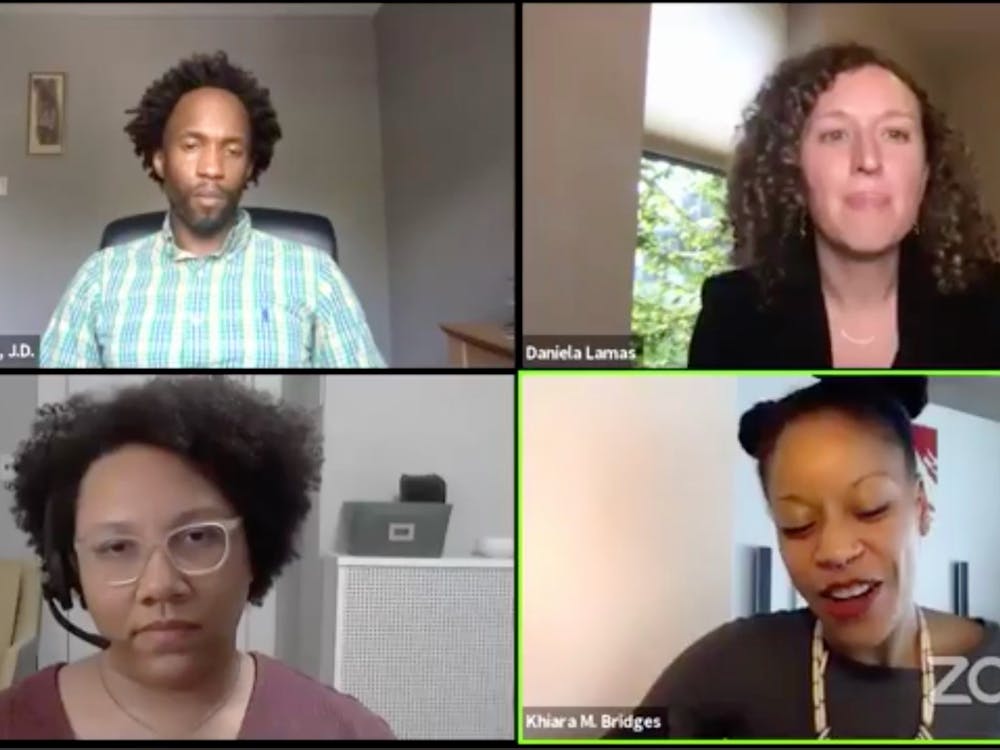COVID-19 has highlighted systemic issues, experts agreed at a Thursday discussion—ones that can’t be resolved with a vaccine.
The panel featured three panelists who discussed how implicit bias and systemic racism have affected health care, particularly concerning COVID-19, and negatively impacted disease outcomes for people of color.
The event was hosted by the Duke Science & Society as part of their Coronavirus Conversation series. It was moderated by Thomas Williams, senior lecturing fellow at the Duke School of Law, and co-hosted by Duke’s Center for Science and Justice, Samuel Dubois Cook Center on Social Equity and Center on Law, Race and Politics.
“We’re seeing ongoing violations of Black and brown bodies right now, in really obtuse, violent ways,” Williams said, citing the killing of Breonna Taylor and shooting of Jacob Blake. “The conversation we’re having is arguably speaking to a more insidious violence, one that impacts Black and brown bodies perhaps even far more than those very aggressive, intense incidents of violence.”
Khiara Bridges, a professor at the University of California, Berkeley School of Law, began by highlighting that racial inequities in health care are most often explained by institutions in terms of “race-specific genetic variations” ––an untrue and problematic idea, she noted––or implicit bias.
But Bridges said she feels that “racial disparities in health cannot be explained entirely in terms of implicit bias,” citing that implicit bias alone can’t explain why “people of color are at the bottom of most measures of social well-being” and often incarcerated, unemployed, reliant on a social safety net and more likely than white people to die violent deaths. She argued that the opposite correlation is true: These trends are what cause implicit biases.
“We would see a lot of things if we paid attention to structural racism,” Bridges said. “Our conversations about implicit bias can’t stop there. They have to be put into conversations with these things that we already know about structural racism.”
Implicit bias can be detrimental to the health care experiences of some patients, said Sylvia Perry, assistant professor of social psychology at Northwestern University.
She said that if physicians are exhibiting implicit bias towards their patients, then their trainees will go on to adopt some of the same behaviors after medical school. This, Perry explained, is an issue that implicit bias training––a practice increasingly adopted by medical schools––may not be able to resolve.
“There’s a disconnect between the formal stuff that’s happening and the informal stuff that’s happening,” she said.
Perry shared an experience about a time she saw a health-care provider who made false assumptions about her diet, health and cultural practices as a Black American. She said it “reduced [her] trust in that provider” and “made [her] feel a lot of discomfort about [herself],” which impacted her willingness to return to that provider.
This negative cycle can be particularly harmful during the coronavirus pandemic, Perry argued. She believes there is “probably a gap of peoples’ willingness to go get tested if they’ve had negative experiences in the past.”
She and Williams explained that to them, the “quality of care” they receive is defined by their interactions with medical professionals, not just the quality of the physical treatment.
Daniela Lamas, a pulmonary and critical care physician at Brigham and Women’s Hospital, acknowledged the existence of a “white/non-white or Black/non-Black difference” in how doctors determine various medical factors, such as normal pulmonary or kidney function, a falsehood she said can potentially lead to inaccurate outcomes in diagnoses and patient treatment.
“I think there’s a danger in hospitals now for COVID to play out the same way,” Lamas said.
Perry said that many medical professionals may not realize that they are capable of engaging in this kind of behavior, especially because they chose that profession due to their desire to help others.
“Race is a social construction, but it’s real and has consequences,” Bridges explained. “It’s not a biological category that has political effects. It’s a political category that has biological effects.”
Perry said she was “frustrated” seeing how shocked people are now that COVID-19 has exposed a variety of systemic inequities, noting that many “are just now realizing what researchers have been trying to say for a very long time.”
“It’s everywhere you look if you decide to,” Williams said.
Get The Chronicle straight to your inbox
Sign up for our weekly newsletter. Cancel at any time.

Leah Boyd is a Pratt senior and a social chair of The Chronicle's 118th volume. She was previously editor-in-chief for Volume 117.

